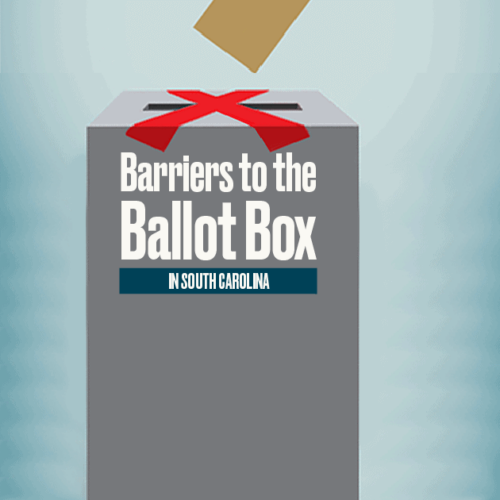Introduction
Multiple legal battles have played out this fall over how South Carolina will process absentee ballots, with mixed results, and with one case going all the way to the U.S. Supreme Court.
More than 1.1 million mail-in ballots had been cast in the state as of five days before the election, compared with 133,000 by mail during the entire 2016 election.
Sign up for The Moment newsletter
Our CEO Susan Smith Richardson guides you through conversations and context on race and inequality.
The state passed legislation allowing anyone to vote absentee without a special excuse this year due to the COVID-19 pandemic. And one of the most expensive U.S. Senate races in the country has been fought between incumbent Republican Sen. Lindsay Graham and Jaime Harrison, who would make history as the first Black Democrat to be elected to the Senate in the South since Reconstruction.
South Carolina’s aggressive discrimination against Black voters prior to the 1960s landed it on the federal Voting Rights Act list of states that were required to get “preclearance” from the federal government before changing election laws and practices.
South Carolina has always made it more difficult to vote than some other states. Residents must register to vote 30 days before an election, the longest period allowed by federal law. Its felony disenfranchisement law disproportionately affects Black citizens.
But voting rights advocates have feared reversal or erosion of key protections since the U.S. Supreme Court struck down the preclearance requirement in 2013’s Shelby County v. Holder decision. The South Carolina chapter of the ACLU has been recruiting poll monitors this fall to make sure that local election officials are obeying the law and not turning away voters of color.
Here’s a look at some of the most significant barriers to voting rights and access in the state:
Absentee ballots
Voting rights advocates have won one key battle over absentee ballot counting in South Carolina this fall and lost one.
The U.S. Supreme Court overturned lower court rulings that found the state’s requirement that absentee voters get a witness to sign their absentee ballot submission was too much of a burden during a pandemic. But because the state had been operating under the previous courts’ rulings, the decision won’t apply to ballots received prior to Oct. 7.
Advocates are worried that could disenfranchise thousands this year, especially because the Supreme Court’s decision requiring witness signatures came after local officials had sent out mailers telling voters that no witness signature is required.
In a separate case, a federal judge ruled on Oct. 27 that the local officials cannot reject absentee ballots due to mismatched signatures, and that any ballots rejected so far for that reason must be reviewed and processed again.
Whether ballots are rejected for that reason, and how aggressively, has varied depending on the community in South Carolina. And there is no provision in state law requiring local officials to notify voters that their ballot has been rejected and to give them an opportunity to rectify the problem.
Voter ID
South Carolina’s Republican-controlled legislature passed a strict voter ID law in 2011 that was immediately blocked by the Obama administration’s Justice Department under the old preclearance rules of the Voting Rights Act. It would have prohibited people from voting if they did not have government-issued photo IDs.
Preclearance went away with the Shelby decision, but the law was modified after partially successful court challenges.
Today, voters must present a photo ID at the polls that can include a South Carolina driver’s license or non-driving ID card, including a concealed weapons permit, a federal military ID, a passport, or a special voter registration photo ID card that residents can request from the state.
But if they’re unable to produce one, they can either cast a provisional ballot and return within a few days to produce the ID for it to count, or they can sign a “reasonable impediment” affidavit saying they are unable to obtain an ID for one of a number of reasons. According to the South Carolina secretary of state’s office, “This ballot will count unless someone proves to the election commission that you are lying about your identity or about having the listed impediment.”
But voting rights advocates say that the provisional ballot confirmation process is not easy, and still opens the door for widespread disenfranchisement.
Felony disenfranchisement
South Carolina residents convicted of a felony lose their voting rights while they are serving time in prison, or are on probation or parole.
According to the ACLU, Black voters represent 64% of the people disenfranchised by this policy, “even though they represent only 27% of the state’s voting-age population.” The practice of disenfranchising voters for felony convictions spread after the Civil War, as states paired it with aggressive efforts to arrest Black men as a way to maintain white political control.
Read more in Money and Democracy
US Polling Places
The District of Columbia learned how to run an election in a pandemic
The primary election was a mess, but the voting process has since improved.
US Polling Places
In Kansas, a legacy of voter suppression clouds progress
Activists push back against an unfounded fear of voter fraud.


Join the conversation
Show Comments